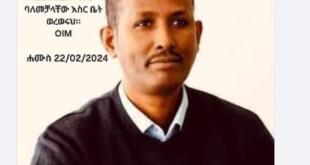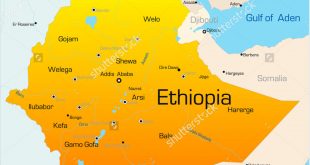By Tolera Fikru Gemta
The current contending critical discourses regarding Oromo-Ethiopia relation on most Social Medias has retrieved my memory during my journalistic engagements in the golden era of free press. It was a time when scholars from different ethnic background particularly Oromo and Amhara were extensively engaged in the discourse based on contending interpretation of Ethiopian history, using the different private free presses. Chief among the Printing Medias that were hosting such critical debates include Urjii/Siefe Nebalbal newspapers and Tobia magazine. Throughout the long established historical discourse Amhara elites were pretending to present themselves as vanguard of Ethiopian unity while in reality they were promoting sectarian interest of their own ethnic group at the expense of others identity, culture, language and religion.
As matter of fact the prolonged discourse established among these contending elites/scholars had significantly shaped the future of their respective line in very different ways. In the case of Oromo, it served as a chief instrument for the revival of Oromo nation/identity in various aspects (historically, ideologically, psychologically) and to the extent of furthering the emergence of Qubee Generation. The generation in the words of Frantz Fanon “that came to scene with unbelievable capacity to change the trend”. Consequently, not only Oromo, but also other nations which had been subjected to national domination have been vibrantly used the controlled opportunity they got through Ethnic Federalism Political framework to restore back their lost identity to some extent.
To the contrary elites who were subscribed to imperial nostalgia remained stick on promoting the bygone unrealistic “Oneness” of the country and peoples/ nations and nationalities; Oneness in all in all aspect of political, cultural, language dimensions. Here I have to mention a relatively progressive thinking of certain group of persons from this camp who attempted to transform the autocratic and pseudo political intentions. Such persons include a journalist and political activist Eskender Nega. I personally appreciate his position regarding ethnic based political institutionalization and mobilization in Federal political framework. He used to put a motto, which I still remember, on the private newspapers he had been publishing. The motto read as follows, “Ye Amhara Ezeb TarikYeseral” meaning “Amhara people shall make history”. His argument was logically a response to the actionsa nd omissions of successors Professor Asrat Woldeye’s party called All Amhara People’sOrganization (AAPO). The major worry of Eskender’s and those who support his views during this time was that, Amhara as second major ethnic group after Oromo would finally left without formidable opposition party due to its elite’s unrealistic approach to Ethiopian political system. This was the time when Hailu Shawel decided to change All Amhara People’s Organization to All Ethiopian Peoples’ Organization(AEPO) without making any slight change in both organizational arrangement and political base of the party. Consequently, Eskender’s and his followers’ effort faced tough challenge from those who preferred to play bogus political missions undercover of Unity, multinational party, liberalism and so on. Finally it has been clearly observed that in Ethiopian opposition political movement such pseudo multinational claims posed critical challenge which makes it fragile and unstable.
The Trend in the Social Media Era
I thought that the era of promoting sectarian ethnic interest using pseudo multinational frameworks was long ended. This was my understanding even four years ago when I was editor-in-chief my last newspaper, Raji. Asked by the then “Addis Neger” newspaper editor Tamirat Nagera, about the role of the Oromo focused newspapers in the past and present, I argued that for the past two decades most of the private free presses (including those targeting on Oromo issues) were focusing on debate on the formation of Ethiopian Empire and its consequences. That trend has created enough awareness among the targeted public in various ways. Thus, the current agendas of such presses indeed should focus on the solutions to most contending perspectives on the Ethiopian politics than wasting energy on debating past histories (most of which was found to be irreconcilable).
However, unfortunately, with emergence of the powerful Social Medias including Face book, twitter and blogs, the aforementioned contending issues reappeared as it had been observed in the past. This reality is what Mexican poet and writer, Octavio Paz, described as “the past reappears because it is a hidden present”. Most strikingly, we are observing Face bookers and bloggers subscribing to Ethiopianst thesis who consider all atrocities committed on Oromo and South nations as a holy action sought for the building of the empire. In this era of social media, we are still observing many who are aspiring for Menelik Ethiopia type of oppression that never tolerate the self-expression and emancipation of Oromo as Oromo, Sidama as Sidama, Walayita as Walayita, Tigre as Tigre, Somali as Somali and so on. After more than decades of extensive politicaldiscourse on the formation of Ethiopian Empire and immense awareness the peoples on the reality, it is heartbreaking to come across with such pseudo nationalists who get mad because of Jawar, an Oromo activist present himself as “I am OromoFirst”. It is equally distressing to know the continuation of the autocratic legacy among our friends living in the most democratic state of USA but pursue physical attack on a person who democratically opposes their ideas, such as committed on journalist and author Abdi Fite.
In the present day Ethiopia understanding the critical level of awareness among the peoples who were previously exposed to national domination, I do not imagine any person from these ethnic groups would give response other than what Jawar actually did, given that similar question is posed to him/her. The existing reality tells that a Sidama guy would respond saying “I am Sidama First”, as there is no way that he/she can be another identity than being what he/she practical living with. Thus both the campaign against Jawar and deliberate miss representation of Oromo peoples struggle, is simply an extension of the effectively failed pseudo-nationalism under the bygone imperial ambitions of “one language, one culture, one religion, one nation” etc.
Most importantly, the approach of those aspiring for Menelik type of political system remain without undergoing any change in this social media era. Chief among such is, masking their faces with fake Ethiopian nationalism to claim that they are thinking beyond their own ethnic line. The whole story is, however, resembles to the change in the name of All Amhara People’s Organization to All Ethiopian People’s Organization to claim pseudo multinational representation.
Conclusion
The emergence of the powerful social Medias would have play facilitative role for democratic way of interactions between various political perspectives which contributes for lasting solutions for the multifaceted fundamental problems. Unfortunately, we are engaging in regressive discourse mainly because of the people who still failed to accept historical truth and further intending to impose own autocratic political aspirations. However, we have wittiness that playing with such pseudo-identity in an attempt to impose sectarian ethnic interests is no more benefit any group. It rather aggravates grievances and hence adversely impacts the future relations of the peoples.
* Tolera Fikru Gemta was D/Editor-in-Chief of the former Seife Nebelbal weekly independent newspaper. He is also a founder and Editor- in-Chief of the formers The Voice and Raji independent weekly newspapers. He authored the well known Afaan Oromo novels Imimmaan Haadhaa (2007, 2010) and Qeerransa Bokkaan Dhaane (2012). He is currently working for nongovernmental organization in communication sector.




